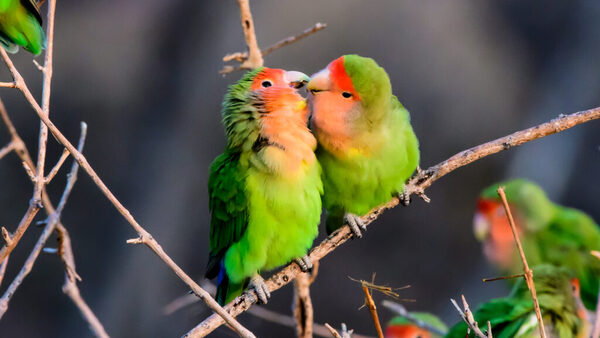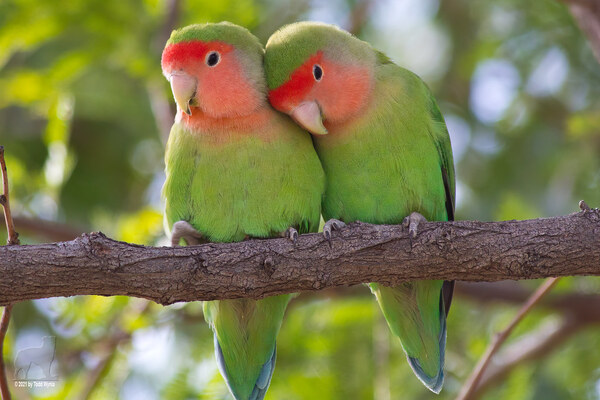The lovebird (Agapornis), a small, colorful and playful parrot species, is a popular pet due to its affectionate nature and vibrant plumage. If you're a lovebird owner, one of the most important aspects of their care is ensuring they are fed the right diet to keep them healthy and happy. But what exactly should you feed your lovebird to meet its nutritional needs?

In this article, we will break down the best foods for your lovebird, including essential nutrients and safe feeding practices. Whether you’re a new lovebird owner or an experienced bird enthusiast, understanding what to feed your pet is essential for promoting longevity and well-being.
When it comes to feeding your lovebird, it's important to offer a balanced diet that consists of both seeds and pellets. While lovebirds enjoy seeds, a seed-only diet can lead to nutritional imbalances over time.
Pellets: High-quality, nutritionally balanced pellets are recommended by avian experts as the core of a lovebird’s diet. These pellets are specially formulated to provide essential vitamins, minerals, and amino acids. Pellets help prevent the selective eating habits of seeds, ensuring that your bird gets a well-rounded diet. Make sure to choose pellets that are specifically designed for small parrots like lovebirds.
Seeds: Seeds can be given in moderation, but should not be the main component of your lovebird’s diet. A variety of seeds, such as sunflower seeds, millet, and safflower, are suitable, but they are high in fat and low in essential nutrients. Too many seeds can lead to obesity and other health problems.
A healthy diet for lovebirds should include a wide variety of fresh fruits and vegetables. These provide vitamins, minerals, and fiber, helping to maintain your lovebird’s health.
Fruits: Lovebirds enjoy a variety of fruits, including apples, bananas, grapes, pears, berries, and mangoes. These fruits are rich in vitamins like vitamin A, C, and E, which support the immune system and help maintain vibrant feather color.
Vegetables: Vegetables are also crucial for a well-rounded diet. Offer leafy greens such as spinach, kale, collard greens, and parsley, as well as other veggies like carrots, sweet potatoes, broccoli, and bell peppers. Avoid feeding lovebirds iceberg lettuce, as it has little nutritional value.
While lovebirds primarily consume plant-based foods, they also require a small amount of protein in their diet to support muscle growth and repair. This can be provided in various forms:
Cooked eggs: Scrambled or boiled eggs are an excellent source of protein for lovebirds. Make sure they are cooked thoroughly, and avoid seasoning them with salt or spices.
Legumes and beans: Offer well-cooked lentils, chickpeas, or kidney beans as a good source of plant-based protein.
Nuts: Small portions of unsalted nuts, such as almonds or walnuts, can be given as a protein-rich snack. However, due to their high-fat content, nuts should be fed in moderation.

As much as lovebirds love to sample various foods, there are some foods that you should never feed them, as they can be harmful or toxic. These include:
Avocado: Avocados contain persin, which is toxic to birds and can lead to serious health issues.
Chocolate: Chocolate contains theobromine, which is toxic to birds and can cause heart problems and seizures.
Caffeine: Caffeinated beverages or foods (such as coffee and tea) can lead to severe health issues, including heart palpitations.
Alcohol: Alcohol is poisonous to birds and should never be offered in any form.
Onions and garlic: These contain compounds that can cause digestive issues and damage to red blood cells in birds.
Like all pets, lovebirds need access to fresh water at all times. Ensure your bird’s water bowl is cleaned daily and filled with clean, non-chlorinated water. Dehydration can lead to health issues such as kidney problems, so it’s crucial to monitor water intake.
While a balanced diet is important, lovebirds enjoy occasional treats. However, treats should be given in moderation and should not replace regular meals. Healthy bird treats include:
Millet sprays: A common treat for pet birds, millet sprays are a good source of carbohydrates and will encourage foraging behavior.
Herbal mixes: You can offer small amounts of dried herbs like chamomile or hibiscus for variety and flavor.
Avoid sugary or overly processed treats, as these can cause obesity and other health problems in lovebirds.
To maintain a healthy diet for your lovebird, you should aim to provide fresh food twice a day—once in the morning and once in the evening. Remove any uneaten fresh food after a few hours to prevent spoilage. Always monitor the portion sizes to avoid overfeeding, as lovebirds can easily become overweight.
Feeding your lovebird a balanced diet is key to keeping them healthy, vibrant, and full of energy. Offer a combination of high-quality pellets, seeds, fresh fruits and vegetables, and small amounts of protein to ensure your bird gets the necessary nutrients for a long and happy life. Avoid toxic foods and always provide fresh water. By following these dietary guidelines, you can ensure your lovebird thrives and enjoys a fulfilling, healthy life.
The Best Cage Setup for Lovebirds
How to Care for Your Lovebird: A Beginner’s Guide
Common Health Issues in Lovebirds and How to Prevent Them
By following these dietary tips, you can ensure your lovebird lives a healthy and happy life, and you will deepen the bond between you and your feathered friend!
animal tags: Psittaculidae
We created this article in conjunction with AI technology, then made sure it was fact-checked and edited by a Animals Top editor.